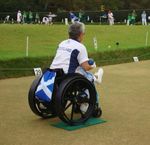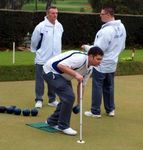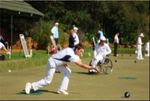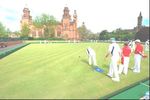Disability Bowls in Scotland - Scottish Disability Sport
←
→
Page content transcription
If your browser does not render page correctly, please read the page content below
Disability Bowls in Scotland
This fact sheet provides an overview of disability bowls in Scotland. The factsheet also
provides useful contacts for learners and improvers, potential volunteers, coaches and
officials.
History of Disability Bowls Scotland won triples gold for physically
disabled para sport bowlers at the
Bowls is a game of skill, precision and Commonwealth Games in Manchester in
tactical awareness, appropriate for players of 2002 and pairs silver for visually impaired
all ages and abilities. Bowls inspires
teamwork and quality communication
between participants. Bowls encourages
community engagement and has clearly
defined pathways to performance and
excellence.
Up to and including the 1996 Games in
Atlanta, bowls was part of the Paralympic
programme. Stricter qualifying criteria and a
reduction in the number of nations and
players resulted in a change of status for the bowlers at the Games in Glasgow in 2014.
sport within the Paralympic family. The
member nations of IPC Bowls then voted SDS and Bowls Scotland have for many
unanimously to form a new independent years been involved in encouraging players
International Federation with greater control with disabilities to participate and compete in
over the future of bowls. In 2005 in Australia, discrete and inclusive bowls settings. SDS
International Bowls for the Disabled (IBD) Branch and Scottish championships have
was incorporated. been around since the 70s and the Scottish
disability bowls squad was formed in
For Scotland, Scottish Disability Sport (SDS) preparation for the World Championships in
is the member organisation of IBD. Scotland Kuala Lumpur. Scotland’s leading disability
has progressed from finishing third at the bowlers benefit from all that SDS and Bowls
IBD World Championships in Australia to Scotland have to offer in coaching,
second four years later in 2011 in South competition and development.
Africa. The 2015 IBD World Championships
were held in Wellington, New Zealand where Different groups of bowlers with specific
Scotland place second in the medal table. impairments have over the years established
their own clubs in mainstream club facilities.
Clubs for bowlers who use a wheelchair or
have a visual impairment have been the
most successful.
Bowls Scotland has appointed Regional
Managers in specific areas of the country
and their presence will add value to the
coaching, club and competition opportunities
already promoted by SDS Branches and
Regional Managers. The challenge for
Scotland is to keep pace with the
Commonwealth para sport playing nations of
the world in particular as the performance
Scotland are bidding to host the 2020 IBD arm of the sport reaches new levels with
World Championships every major international tournament.
Glasgow 2014 was a success for Scotland’s
Updated May 2017para sport bowlers but the Gold Coast in recognition of hand movements at any
2018 will necessitate a raising of the distance or in any direction.
performance bar yet again. Class B2: From the ability to recognise
hand movements up to a visual acuity of
Disability Bowls Classification 2/60 (Snellen chart*).
Classification provides a structure for fair Class B3: From a visual acuity of better
competition in disability bowls. Eligible than 2/60 (Snellen chart) up to a visual
participants have a limitation, loss of body acuity of 6/60.
function or structure (impairment) that leads Class B4: A visual acuity of better than
to a competitive disadvantage in mainstream 6/60 (Snellen) up to a visual acuity of
bowls worse than 6/24 (Snellen) and/or a
significantly reduced visual field of 20
The SDS classification system combines
degrees or less. The player has the
physically disabled and visually impaired
option of being guided by a sighted
bowlers in one class, in most instances. The
director.
system provides separate classes for
bowlers who use a wheelchair, bowlers who Class B5: Ambulant and wheelchair
have a learning disability or intellectual bowlers with restricted grip and upper
body limb function, poor balance and co-
ordination, unable to bowl a full length
jack. A splinting device for bowlers with
limited grip/release hand function may be
used (separate from a bowling arm).
Class B6: Ambulant and wheelchair
bowlers with reduced balance function
(loss of 5 points or more) but able bowl a
full length jack.
Class B7: Ambulant and wheelchair
bowlers with minor balance problems
(loss of less than 5 points).
impairment and bowlers who are totally blind. Class B8: Ambulant and wheelchair
The SDS classes are as follows: bowlers, who have a permanent and
irreversible disability, have lost 10 points
Class 1—totally blind bowlers: B1 on the bench test, but have no noticeable
Class 2—bowlers who use a wheelchair impairment of function.
and have good arms, hands and trunk
*A Snellen chart is an eye chart used by eye care
Class 3—bowlers who use a wheelchair professionals and others to measure visual acuity.
but have weakness in arms/trunk
Class 4/5—bowlers who are ambulant
and not restricted by their physical
impairment during delivery, plus B3
bowlers. Men 4, women 5
Class 6/7—bowlers who are ambulant
and restricted in their bowling arm, trunk
or have balance difficulties plus B2
bowlers. Men 6, women 7
Class 8/9—ambulant bowlers with a
learning disability. Men 8, women 9
The International Bowls for the Disabled
(IBD) classification system for players with Disability Bowls Workshop
physical impairments (B5-B6) and bowlers This SDS/Bowls Scotland workshop
with a visual impairment (B1-B4) is concentrates on lawn and indoor bowls for
structured as follows: players with a physical, visual or learning
Class B1: No light perception in either disability. Coaching bowlers with different
eye up to light perception but no impairments, officiating and classification arethe topics covered by the team of Disability Carpet Bowls
experienced tutors. The workshop will be of
interest to mainstream bowls coaches or Workshop
leaders (16+) providing disability bowls Carpet bowls has been widely promoted by
opportunities in a discrete setting. SDS for almost four decades. The game is
viewed as a development sport for lawn and
Helpful Resources/Workshops indoor bowls. This SDS workshop offers
delegates an introduction to carpet bowls for
IBBA Coaching Video
players with physical, sensory or learning
This video is a coaching resource for those disabilities. The tutor will cover classification,
working with blind and visually impaired rules, equipment and local and national
bowlers. Produced by an IBBA (International pathways. Delivery styles and positioning for
Blind Bowls Association) panel of experts, seated and standing players will be
this resource covers all aspects of coaching addressed. The workshop is interactive and
blind and visually impaired bowlers. part theory and practice. Delegates will
IBBA YouTube link: experience simple plays, practices and rules
http://tinyurl.com/m58tuyj interpretation.
SABB YouTube link: http://tinyurl.com/n7bl2lt
Coach Education
Bowls Scotland is currently developing a
coach education programme for disability
bowls.
Bowls Coaching Manual
A manual has been produced by the SDS
Head Coach on how to coach physically
disabled players. For further details contact Facts—Disability Bowls
Scottish Disability Sport: Bowls was included on the Paralympic
admin@scottishdisabilitysport.com. Games programme of sports up to and
including the Games in Atlanta in 1996. SDS
SABB Coaching Manual Hall of Fame member David Heddle MBE
This SABB (Scottish Association of Blind from Fraserburgh was the last Scottish
Bowlers) resource is included in the Paralympic bowls medallist.
mainstream coaching manual and will shortly
The International Blind Bowls Association
feature as part of the overall assessment for
(IBBA) World Championships were held in
the mainstream coaching course.
Worthing in July 2013. Scottish bowlers won
one gold medal and three bronze medals.
The pan disability Scottish Disability Sport
bowls team selected, prepared and co-
ordinated by SDS progressed from third
place at the IBD World Championships in
Australia to runners-up four years later in
2011 in South Africa.
For visually impaired bowlers a string is run
through the middle of the rink to assist
players to position themselves centrally for
their delivery.
B1-B3 bowlers all play with a sighted director
who acts as their “eyes” on the green and
describes where the jack and bowls lie and
which shots to play.Snellen charts used to measure visual acuity Disability Bowls Competitions
are named after the Dutch ophthalmologist
Hermann Snellen who developed the chart in SDS currently organises the following
1862. national bowls events: SDS Carpet Bowls
Championships; SDS Inter Area Test Match
Bowls were originally made from a material for Bowlers with a Learning Disability; SDS
called lignum vitae, a dense wood giving rise Lawn Bowls Championships; specific SDS
to the term “woods”. Bowls are now typically Branches organise indoor area bowls
made of a hard plastic composite material. competitions.
Leading Players IBD World Championships every four
years—2011 South Africa and 2015 New
Kevin Wallace (Clackmannanshire) 2011 B7
Zealand.
World Champion and bronze medal pairs
winner with Michael Simpson (Fife) IBBA World Championships every four
years—2013 England.
Irene Edgar (Saltcoats)
Para sport bowls was included in the
2013 B2 double bronze medallist at IBBA
Commonwealth Games in Manchester 2002,
World Championships. Glasgow 2014 silver
Glasgow 2014 and will again be included in
medallist with Robert Conway (Glasgow)
the Australian Gold Coast in 2018.
Maria Spencer (Fife) 2011 World Champion
in single hand bowls in South Africa
Key Contacts
Scottish Disability Sport
www.scottishdisabilitysport.com
Key Websites
International Bowls for the Disabled
www.interdisabledbowls.org/
International Blind Bowls Association
www.blindbowls.org
Scottish Association of Blind Bowlers
www.scottishblindbowlers.org.uk
Bowls Scotland
www.bowlsscotland.com
Scottish Indoor Bowling Association
www.bowls-siba.co.ukYou can also read

























































